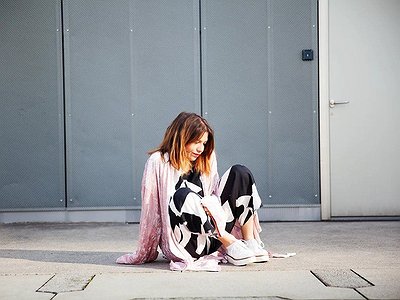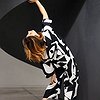Part 1
Name: Gina Été
Nationality: Swiss
Occupation: Songwriter, musician, string arranger
Recent release: Gina Été's "Uszit" is out now.
Recommendations: Virginie Despentes King Kong Theory – a just 80 page short feminist manifesto - the tone, the experience, the thoughts and the conclusions threw me off my feet!
And my current favorite album is Blood by Kelsey Lu –a very talented cellist and singer, I find her music inspiring.
If you enjoyed this interview with Gina Été and would like to find out more about her music, visit her official homepage. She is also on Instagram, and Facebook.
When did you start writing/producing/playing music and what or who were your early passions and influences? What was it about music and/or sound that drew you to it?
I am from a musician’s family, so I’ve always listened to and played music. Only Classical music though. I’ve played viola in the orchestra all my life and I remember “The Moldau” from Smetana being my favorite piece when I was a child, as well as Carmen being my favorite Opera, after I’d seen my aunt dancing pieces of it. I also remember how I was jealous, when my older sister first got the Beatles CD Rubber Soul from her best friend – the first “pop” music I ever consciously listened to and sang along.
I wrote my first song when I was 16 - I’d just discovered poetry writing and how a song could help dealing with heavy emotions. That was what finally drew me into music for good: the possibility of expressing emotions and thoughts through writing my own songs - and the comfort and empowerment I find in that!
When I listen to music, I see shapes, objects and colours. What happens in your body when you're listening and how does it influence your approach to creativity?
Listening by myself, I often imagine moving pictures, almost as if I am inventing a film to the soundtrack I am listening to. Or it turns my life into just that movie. This puts me in a position of ease, where I don’t have to act, but I can just watch the movie I’m in.
Although as soon as it’s music with beats, I am usually the first one to be shaking heavily in the middle of the dancefloor.
How would you describe your development as an artist in terms of interests and challenges, searching for a personal voice, as well as breakthroughs?
Well it’s now 13 years ago, that I’ve written my first song. The only constant I can tell so far is change.
There was and still is so much that I want to learn, so much music I want to listen to; and every new instrument I learn changes the sound of the songs I write on it; every new language I learn to write in changes the choice and shape of my words; every new plugin, program or sample shapes my ear and gives me new sounds that I can thereafter imagine or name and search for.
My music always changes, it changes quickly, it adapts to my moods, my life phases … And I think each time I’d discovered something new for myself (playing the piano on stage, retaking viola on stage, starting to learn guitar, learning a new language, starting to record myself, produce music on Ableton) was a musical breakthrough for me, for I was able to finally create one more sound that I’d been imagining!
I often get to hear that people don’t know what box to put me in. And the older I get, the more I am glad about that! There are so many boxes I want to open and look through in order to see what is hidden in there! And I am just figuring out more facettes of my own voice, of my own being, more depths and shades …
So the final breakthrough I am still working on is for me to truly no longer care anymore about people’s opinion!
Tell me a bit about your sense of identity and how it influences both your preferences as a listener and your creativity as an artist, please.
Identity. Big word.
I can say that I’d always admired artists that I identified with, for I thought, they were living the life or doing the music I’d wanted to live or do. Those idols and role models have changed a lot in the last years. Though without ever consciously chosing that, I have always identified with strong FLINTA*-artists (musicians as well as actors or dancers) who didn’t give a f*** about what society told them to do or be, who dared to cross borders and to invent their own role within.
What, would you say, are the key ideas behind your approach to music and art?
I wish I had key ideas ;) No, I can actually elicit two fundamentally different drivers behind my every move and I am often torn between those.
One is just wanting to do music as a beautiful, aesthetic, joyful thing for my, and hopefully also some other people’s lives. A passion, the connection you feel with people when doing music together, the pride when showing something on stage, just pure love for this way of spending time. The other one is wanting to actually convey thoughts, start an unled discussion, change something, change the system, break out of my assigned role, get people to think about theirs, wake everybody up, wake up!!!
But it remains a constant struggle, asking myself, if music or art in itself has the power to bring about change, to fight the system - not just decorate it nicely … I am still trying to bring the 2 of them together - doing music that I aesthetically love, having fun doing it AND creating something meaningful which will have a positive impact on people’s lives.
I sometimes want to stop making music and rather start fixing myself to trees and roads and borders. But then I am too anxious for that. Then somebody tells me how my music had helped them through a very tough situation or how it has empowered them to keep fighting their own fights and then I think, maybe I am doing quite ok.
But dear reader, I am open to any thoughts on this topic, still figuring it out ;)
How would you describe your views on topics like originality and innovation versus perfection and timelessness in music? Are you interested in a “music of the future” or “continuing a tradition”?
First of all, perfection for me is a concept I want to give little space in music, for music to me is mostly about taste creating or capturing a magic moment. I am rather looking for edge than perfection.
But timelessness is a word I like – I would love people in 10 years to still be able to listen to my music and not think “oh, that’s so 2022” but still connect to it somehow. So I am trying not to get distracted too much by the sound aesthetic of the twenties, but maybe to find deeper meaning, something I want to convey in music and trying to express that with the means I have at hand. And that could be an acoustic piano ballad with strings as you might already have released it in the 60s or an electronically produced pop song, either way, the meaning will stay. So innovation is admirable but if it doesn’t convey anything, to me it’s just a technical skill and not yet art.
That said, becoming an artist who manages to combine the 2 – sounding modern, innovative and distinct and though never losing the connection to “why I do art in the first place” or what I want to convey - definitely sounds appealing.
Over the course of your development, what have been your most important instruments and tools - and what are the most promising strategies for working with them?
I’d say for me there are two main shaping instruments or tools in my life so far:
My first instrument (after the obligatory flute) was the viola. I played classical music, learned to sightread, played stunning oevres in the orchestra together with 60 other kids … Only much later I realized what a gift that was – how much I’d unconsciously learned about the orchestral sound, about harmonies, arrangement and that I could fully trust the experience and sound aesthetics of my ears when working with orchestral bodies!
Now I arrange for string ensembles in pop music and play as a violist in a string quartet with bands such as Patrick Watson, To Athena, Brandao/Faber/Hunger, Panda Lux and Evelinn Trouble!
[Read our Evelinn Trouble interview]
My second life changing tool is definitely Ableton – learning how to record and produce music myself is giving me the independence to just do my own demos, train my ear and start to learn the immense role of “soundshaping”. When starting to do music I was immensely scared of everything involving technical skills, DAWs, Amps, pedals – and it took me some time to overcome that – and to realize, OMG IT’S NOT THAT COMPLICATED!
I only now realize how many (sometimes wrong) artistic decisions people have taken for me when recording my music before, without me getting it, for I didn’t have the vocabulary to express what I’d like to hear.
I am still working on producing my own music, I collaborate with people here and there, but I’d love to once an album all by myself! (And btw my most promising strategy so far: stop believing other people are almighty and know every step of what they are doing and just start doing it yourself. You’ll learn what you don’t know yet and you’ll start asking the right questions)






